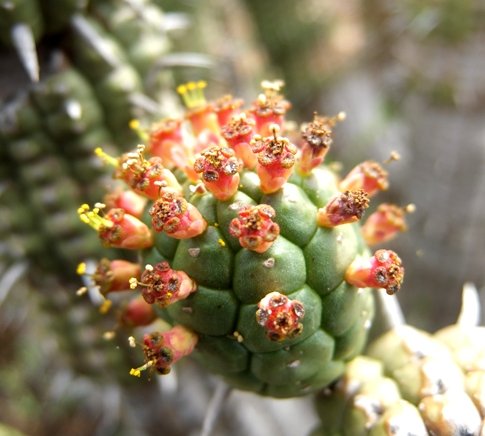Euphorbia mammillaris old male cyathia

Author: Ivan Lätti
Photographer: Thabo Maphisa
Late in the life of male cyathia of Euphorbia mammillaris they turn red and translucent as in the photo. There are still some yellow anthers on some, while others are drying out and turning black, their purpose of existence hopefully fulfilled. Hopefully, because many insect visits should have taken place for pollen transportation to nearby female plants.
The patience of nature involving chance in such an important survival event as pollination, is balanced by overproduction. Propagation security is enhanced by raising the probability of successful hits: many flowers, much pollen, many sticky stigmas and many hungry insects all delivered in close proximity at the same time constitute a success formula proven over millions of years.
Then even the low rain years don’t matter in the lives of hardy perennials. For the insects, some alternative food sources where wing and foot can travel, will ensure survival to be in attendance once more at the next bloom boom.
What will climate change do to all this? It will likely kill off numbers, maybe at significant levels and thereby possibly few or many species. Past extinctions have eradicated large proportions of what lived on the earth at various times long ago. So far never all of them. It depends on how severe the downturn becomes and how long it lasts what proportion will become extinct this time. Like past disasters, the earth will outlive the current climate change. But will its inhabitants and which of them? The residue of extant species, if any survive, will naturally form the base of new cycles of evolutionary development against prevailing odds of the day... and many hard nights! New ecologies will be shaped everywhere or in the patches where life may be possible, expanding from there as capacity is developed in the challenge areas of the day.
Some of these new dominant types, like the residue of Homo sapiens or its possible successor species, may use language and brains once again to shape stories such as new Gardens of Eden. This could represent pioneering stages of (to us) weird types living freely (but dangerously, of course, life expectancy again down in short generation cycles). Problem solving and tribe building could, however, escalate in the formation of new comfort zones, preferred living spaces shaping, even cities again. Since one can dream, add a bit about avoiding at least some past mistakes quicker, like caring for nature and not killing each other (Vlok and Schutte-Vlok, 2010; Wikipedia).

